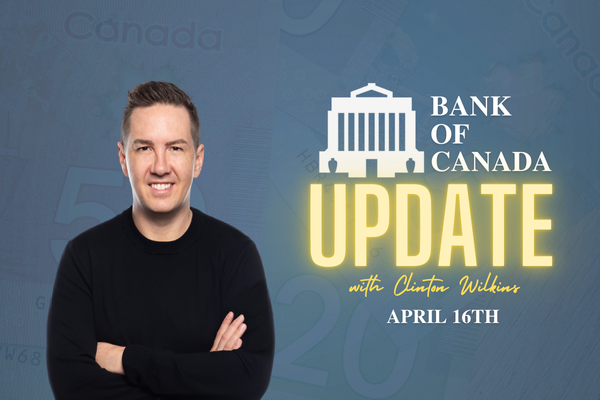On 95.7 News Radio, Clinton and Todd discussed the Yukon's government's new first-time home buyer program, offering low-interest loans to cover up to half of down payments while highlighting similar programs in Nova Scotia and New Brunswick.

News Update: 95.7 News Radio – May 29th
On 95.7 News Radio, Clinton and Todd discussed the importance of credit monitoring due to rising fraud and data breaches.
Todd Veinotte
All right, joining us for a chat is our mortgage guru, Clinton Wilkins. Clinton, always great to chat with you, my good friend. I want to get to this mortgage-free retirement story, but quickly, the Nova Scotia Power thing, and the tie-in with you, of course, is credit, and you’ve always been a strong advocate of people should be monitoring the credit anyway, correct?
Clinton Wilkins
100%. I think credit monitoring is very, very important, especially in today’s day and age. There’s so much fraud happening, it’s really a lot on an uptick. There can be security issues around things online, data breaches, like what happened with Nova Scotia Power. Consumers can pay for credit monitoring from both Equifax and TransUnion. It is important to monitor both, but there are a couple of free apps out there, Todd, that people can subscribe to. There’s one called BorrowWell, which ties in the data from Equifax and CreditKarma, which brings in the data from TransUnion. Those are free apps. You can download them from the App Store. You do need to give them all your personal information, and they’re going to try to sell you some credit products from different banks. That’s how they monetize and how they make money. But I do have these apps personally, and I know a lot of consumers do use them. So, if you don’t want to pay for credit monitoring, or if you don’t have access to a free credit monitoring service, I would check out those free apps.
Todd Veinotte
So people listening right now who might not even have been impacted by this, this might be an opportunity to kind of kick in the rear end and do this, because it’s, it’s prudent anyway, obviously, what is your core message here?
Clinton Wilkins
And there are going to be small changes to consumers’ credit throughout the month. You know, month to month, it’s determined by, obviously, repayment history as well as utilization. Those are kind of the two biggest impacts on a consumer’s credit. There are also many different credit factors. So, you know, I would say, monitor your credit, especially if you’re planning on doing a big transaction, ie maybe changing jobs, getting an apartment, obviously, buying a home and getting a mortgage, getting a car. There are many things in people’s lives that are impacted by their credit and their credit history, so it’s certainly good to be monitoring it, and there are often times errors on there that can be corrected. So monitor credit, and if you do find something that’s not right, then take the action to correct that.
Todd Veinotte
Okay, fair enough. All right. This story, I saw it on the global news website. A third of Canadians approaching retirement in the next couple of years expect to keep paying their mortgages after they’ve stopped working this according to a new report from Royal LePage. And this is something that you and I have talked about a lot on Mortgage 101. And this is, this is becoming a lot more common, isn’t it?
Clinton Wilkins
Certainly is. I would say that about a third of our clients are of retirement age, Todd. For many consumers, the biggest asset that they have is their home. So we have a lot of clients that, even pre-retirees, will sometimes mortgage their house or refinance their home or put on a home equity line of credit. Very, very common for a consumer to do that. And I think a lot of the consumers that we’re seeing that are entering retirement, or even pre-retirement or already retired, are taking longer amortizations. They’re taking amortizations at 25 and 30 years. And the way that they look at it is, they’ve worked hard all their life, and their home is their biggest asset, but they’re supplementing, potentially, their pension income to help live a better quality of life in retirement, and leveraging that asset. So it’s very, very common, I would say it is less common, for retirees to then focus on really, still trying to pay it down. You know, when you’re retired, you typically have a smaller amount of income. And I think, you know, most retirees want to have a good quality of life, and they’re using their home to help that make, make that happen.
Todd Veinotte
Is there a kind of paradigm shift when it comes to people and a mindset? Because we know that the previous generations, it was getting that paid off, and that was, that was considered a key component to being retired, and part of your retirement plan that’s that’s kind of changed, or not kind of changed. I think there’s a, there’s a shift in philosophy with all this.
Clinton Wilkins
Canadians, in general, have a much higher tolerance to indebtedness. Todd, I think that culture across the board has changed, but I think for retirees specifically, the cost of living is very high, but they’ve also received such a huge increase in their net worth with the increase, property values. So I think they’re thinking about this, that that home that was once worth, 250, 300 thousand is now worth 600,000 and they’re thinking to themselves, well, I can leverage, you know, the difference of this increase and live off of this money, you know, improve my quality of life, pay down unsecured debt, and a big one is they are providing large gifts to their kids to help them enter the housing market. The average gift right now across the country that we’re seeing for the gifted. Payment is somewhere in $the 100,000 range that parents are gifting to get kids into homes. So that shift has changed. When I first started doing this 20 years ago, almost 21 years ago, the average gift was 5000, 10 000, 20 000, 25 000 maybe. But there’s been a major shift in the last five years with family gifts and helping kids get into the real estate market. And oftentimes, the kids need this size of gifts to be able to qualify for Todd. That’s the biggest challenge, because the real estate prices have gone up quicker than the income from these consumers.
Todd Veinotte
All right, so, are they leveraging money from their savings, or are they leveraging money from their equity in their home to give that gift?
Clinton Wilkins
I think it’s both, yeah, and I think the ones that are leveraging equity in their home, they’re seeing themselves that they’re, you know, value their home has doubled and lost five years. We’ll call it. And they say, if I do not give a gift to my kid now, they may never be able to get into the housing market.
Todd Veinotte
Okay, so you’re sitting there, and you may have $100 000 left on your mortgage, and although now, like you said, your home is worth $700 000 as opposed to when you bought it, three or four, or whatever it is. So carrying that debt, servicing that debt in a mortgage, low-interest mortgage is pretty easy financially and fiscally. And you know that at some point, when you saw when you pass on, or when you sell or whatever, that that money’s coming your way, it’s like money in the bank, I guess, is right, having that equity.
Clinton Wilkins
It certainly is money in the bank for sure. And you know, there certainly has been a big uptick in reverse mortgages as well. You always hear about the Canadian home income plan, and that’s, you know, that historic one that you remember the commercials and seeing them on TV. It’s a great way for retirees to be able to leverage the equity in their home and supplement their income. And, you know, really putting a mortgage on the home, or whatever style it is, whether it’s a HELOC or reverse mortgage or traditional mortgage financing, the real goal is to keep people in their homes, Todd. And this cost of financing is a lot less than the cost of rent. You know, a two bedroom unit in Halifax, the average rent is around $2500 and the cost of boring for all of these products, obviously, depending on how much they’re drawing down and how much they’re borrowing, is typically a lot less than 2500 so the way I think consumers are seeing it is, hey, I can leverage my home for whatever reason the outcome needs to be, but the actual cost to service that debt is a lot less than paying rent.
Todd Veinotte
What are your thoughts on this kind of generational divide, almost generations being pitted against each other, those that have equity in homes and those who don’t, and on the outside looking in? What are your thoughts on on kind of generational divide that we’re seeing in this country right now?
Clinton Wilkins
I think it’s the biggest generational wealth transfer. That’s what we’re seeing right now. Todd and now the boomers are passing away and passing their net worth down to their kids. It’s going to be interesting to see what happens with the next generation, because obviously the culture is changing, but even when we’re thinking about things like multi generational housing, that was very popular, then it became unpopular, and now it’s becoming popular again, obviously just due to the cost of housing and the cost of really just operating a household in today’s, you know, economic situation. So I think there certainly is a shift around that culture, and it’ll be interesting to see what happens again, another 25 – 30 years.
Todd Veinotte
In general, here in Halifax, we the trend is, what when it comes to to to the housing market, are, is, you’ve often said on the show, and you talked about it, that you feel as though that we’ve not been in a bubble here in Halifax, and Halifax is, is, is not in that circumstance that’s been described in Toronto and Vancouver in particular, to the condo market. So you still feel that way.
Clinton Wilkins
I 100% feel that way. The market’s stronger than it ever has been here in Halifax, our number one issue, Todd, is still supply. We are not having enough listings, and there’s too much demand in the marketplace, so we’re still in that seller’s market. And, you know, I think part of it was, you know, we said this before, the little old lady in the little man did want to sell their home for whatever reason they didn’t have another home to go to. But now we’re seeing more and more apartment starts, and I think when we see more of these online, it’s going to help us rebalance, you know, the resale market in terms of homes. But we still need to really be working with all levels of government to get those shovels in the ground and get more housing starts going. And it’s all types of housing that we need.
Todd Veinotte
All right. Clinton, always great, my friend, appreciate it. Look forward to chatting about teeing up a Mortgage 101 in June.


